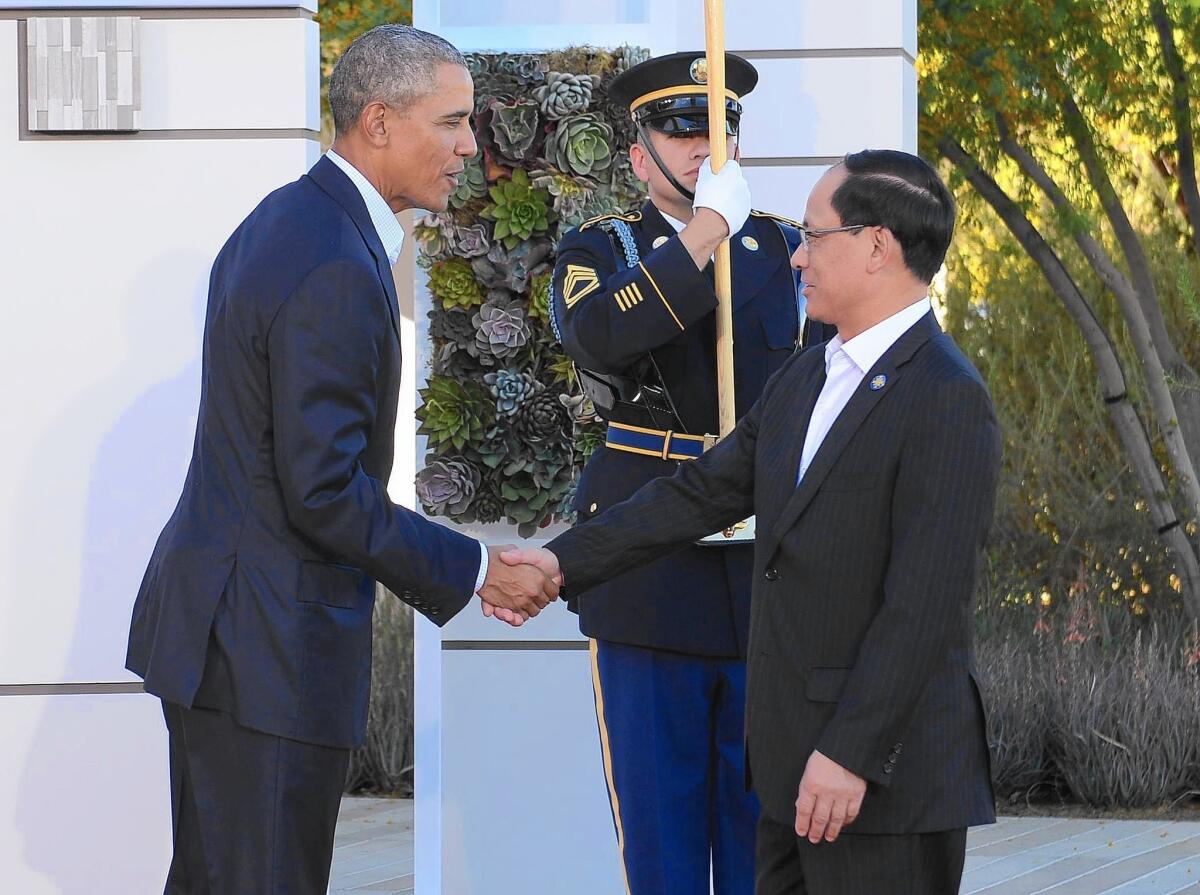President Obama works to lasso opportunities presented by Southeast Asia

Reporting from RANCHO MIRAGE, Calif. — President Obama used a holiday honoring the holders of his office to stake his claim to a key part of his own White House legacy: the rebalance of U.S. foreign policy toward the Asia-Pacific region.
Obama welcomed 10 Southeast Asian leaders on Presidents Day to Sunnylands, the sprawling Rancho Mirage estate where he often entertains foreign dignitaries.
A procession of leaders arrived sans neckties at the decidedly informal setting, one that Obama aides said offered “a rare opportunity for candor” to discuss issues of shared concern: territorial disputes with China, the North Korean nuclear program and the global fight against Islamic State, along with a pending trade agreement among the U.S. and several Asian nations.
For Obama, the gathering is chiefly another opportunity in his long-term plan to nurture relationships with Southeast Asian leaders and to bolster the regional alliance among Indonesia, Malaysia, the Philippines, Singapore, Thailand, Brunei, Vietnam, Laos, Myanmar and Cambodia.
The coalition “is central to the region’s peace and prosperity, and to our shared goal of building a regional order where all nations play by the same rules,” Obama said at the summit’s opening session.
“As president, I’ve insisted that even as the United States confronts urgent threats around the world, our foreign policy also has to seize on new opportunities, and few regions present more opportunity in the 21st century than the Asia-Pacific,” he added.
The assembly represents the first gathering in the U.S. of the Assn. of Southeast Asian Nations, and for the gathering Obama selected the sun-drenched Annenberg family estate where he has hosted Chinese President Xi Jinping and King Abdullah II of Jordan — something of a Camp David West for this president. The ranch is home to elaborate gardens and an elegant meeting space, a desert haven Obama has repeatedly gotten away to this time of year. He noted the day’s snowfall in Washington as he welcomed his counterparts.
The meeting is itself “an historic occasion,” national security advisor Susan Rice told reporters.
She said the summit on U.S. soil “reflects a return on seven years of significant and sustained investment by this administration and by President Obama personally in the Asia-Pacific and in Southeast Asia in particular.”
NEWSLETTER: Get the best from our political teams delivered daily
White House officials are not predicting grand agreements or other developments that typically signify a consequential summit. Rice sought to downplay expectations, for instance, in a joint statement expected Tuesday on the South China Sea, amid reports China was pressuring some ASEAN nations to avoid using language critical of its aggressive moves there.
In this case, said senior Obama aides, the president primarily wants to strengthen ASEAN and U.S. ties to the organization. At an ASEAN summit in Malaysia in November, the U.S. elevated its relationship with the alliance to the level of strategic partnership. The president is also eager to showcase the proposed Trans-Pacific Partnership trade agreement that encompasses 40% of the global economy, including several ASEAN nations, even as the likelihood of its ratification in Congress in this election year grows increasingly unlikely.
Rice said the region was becoming “the world’s political and economic center of gravity,” and noted that the 10 nations collectively were the fourth-biggest U.S. export market — including $11 billion in goods from California.
Every time Obama manages to meet with Asian executives and heads of state, diplomats to Asia cheer. His perennial plan to rebalance U.S. foreign policy focus from fighting in war zones to trading in Asia has been hard for Obama to pull off, with crises in the Middle East demanding U.S. resources instead.
If Obama will attend to Asian leaders during his final year in office, analysts say, the payoff to the American economy and national security will be significant.
“If you think about the United States in the next 20 years trying to capitalize on the opportunities and manage the challenges of the Indo-Pacific, we’ve got a really good chance,” said Patrick Cronin, senior advisor and senior director of the Asia-Pacific Security Program at the Center for a New American Security.
“And it’s largely because the administration has started to build institutions and institutionalize the U.S.-Southeast Asian relationship in a way that we had not locked in,” he said.
In a side meeting at the conference Monday, Obama told Vietnamese Prime Minister Nguyen Tan Dung that he will visit his country in May.
The announcement comes months after Obama hosted the first visit from Vietnam’s Communist Party leader to the White House since normalizing relations 20 years ago.
Then as now, Obama has weathered criticism for meeting with the Vietnamese leader, given Dung’s rocky record on human rights.
But aides to the president believe they will have more leverage in the relationship with greater diplomatic engagement.
Besides that, the administration is working to build the relationship with Vietnam as China flexes its muscles around Southeast Asia.
Parsons reported from Rancho Mirage and Memoli from Washington.
ALSO
Volcanic spires and Joshua trees: Obama protects 1.8 million acres in California’s desert
In search for Scalia’s successor, Obama may see GOP opposition as incentive to select a liberal
Reagan in slippers. Sinatra by the pool: Inside Sunnylands, the Camp David in California’s desert
More to Read
Sign up for Essential California
The most important California stories and recommendations in your inbox every morning.
You may occasionally receive promotional content from the Los Angeles Times.











